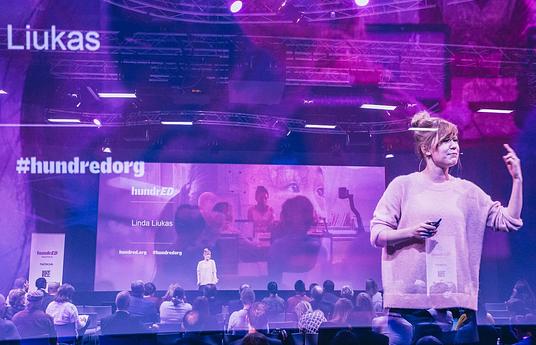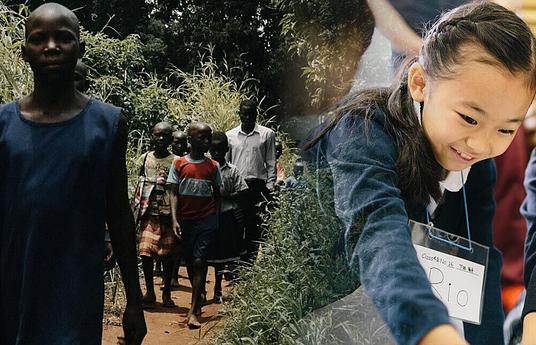The 100 Inspiring Innovations of 2019 have been announced at the HundrED Innovation Summit!
HundrED’s global collection of innovations spanning the breadth of education has been officially released, with all 100 available on our website, for free, now.
This year’s list has sought to cover every area of education, building on last year’s experience and using the knowledge built from the data gathered in HundrED’s research report, Every Child To Flourish, published earlier this year.
‘Last year was more about what’s out there, and understanding the current landscape in education innovation,’ explains Jessica Spencer-Keyse, Head of Research at HundrED. ‘This year, thanks to the previous research process and the multi-stakeholder research in Every Child To Flourish, we were able to see what was lacking and look actively to find innovations tackling them, such as LGBTQIA+, youth-led and children’s rights innovations. This year we tried to get innovations across the whole spectrum as much as possible and were able to find at least one innovation in each area.’
The list also highlights how different countries and areas are focusing on different themes within education. The selection process revealed that Australia and New Zealand are leading the way in nature-based and wellbeing innovations, whereas Scandinavia tends to focus on innovations that support equity. Latin America has found a way to add after-school innovations that supplement where strict government regimens don’t allow for innovation, and Africa is very tentatively moving from focusing on getting every child into school to making sure the education they receive there is of a high quality, and improving teacher training to facilitate this.
The US has particularly stood out in terms of its contribution to education innovations, as Spencer-Keyse explains, ‘The US is leading on project-based, personalized and autonomous learning.’ Though Frederika Warren, Researcher at HundrED, notes that ‘the US needs to do better at scaling from state to state. If you’re a child in the middle of America you’re not receiving as innovative an education as people living on the coasts.’ The US is also leading the way on grassroots innovation with teachers taking the initiative to change education from the ground up, along with Kenya also becoming a particular hotspot for ground-level innovation.
Out of this year’s collection, Warren predicts that US-based Community Share ‘has the potential to have a big impact’ as it’s ‘really simple and has a great concept.’
Spencer-Keyse nods to innovations from this year’s list that are already scaling well, such as Pi-Top, Kahoot! and Big Picture Learning to show other innovations a model of what makes innovations scale well. ‘Pi-Top has a teacher-centric design which makes it easy for teachers to use in the classroom, similarly Kahoot! has done well globally because kids love it and it’s incredibly simple for teachers to integrate into their classrooms. Big Picture Learning’s ability to create new schools around the world in an experimental way is phenomenal, and they’ve created materials that make it easier for teachers from any part of the educational sector to learn how to create a child-centred education.’
Innovators new to this year’s list that Warren and Spencer-Keyse find particularly noteworthy are Kirsten Simmonds from Talking Tree Hill in New Zealand, and Jo Rhodes of Challenge 59 from the UK.
‘Simmonds is really about encouraging the wellbeing of children, and changing the school day to be four in school and one out in nature,’ explains Warren. ‘She also really encourages children to learn about Maori culture (the indigenous culture in New Zealand).’
‘Rhodes has developed a thoughtful, considerate and smart model with Challenge 59, that uses dance and film to transform the health and wellbeing of children,’ explains Spencer-Keyse. ‘She shows how you can do high-quality work both in terms of pedagogy and through the materials that the children create in the project.’ The films created in Challenge 59 by the children have been shared via the BBC, British Film Institute and by the children themselves at youth parliaments and other schools.
Each individual innovation that has made it onto this year’s list has made impactful contributions to the lives of children across the world, and together the 100 innovations illustrate the incredible work being carried out across the field of education by inspiring individuals, organizations and communities.
‘This year’s list captures the wave of education and presents an opportunity to see the most innovative, impactful and scalable examples from across the world,’ explains Spencer-Keyse, concluding, ‘The list shows how the future of education is heading towards a more holistic, facilitator based model, which focuses on wellbeing, social skills and gender equity in a really meaningful way.’
Discover this year’s list here or find out more about what this year’s list tells us.






